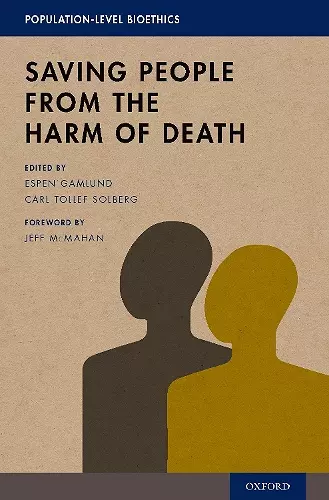Saving People from the Harm of Death
Espen Gamlund editor Carl Tollef Solberg editor
Format:Hardback
Publisher:Oxford University Press Inc
Published:21st Mar '19
Currently unavailable, and unfortunately no date known when it will be back

Death is something we mourn or fear as the worst thing that could happen--whether the deaths of close ones, the deaths of strangers in reported accidents or tragedies, or our own. And yet, being dead is something that no one can experience and live to describe. This simple truth raises a host of difficult philosophical questions about the negativity surrounding our sense of death, and how and for whom exactly it is harmful. The question of whether death is bad has occupied philosophers for centuries, and the debate emerging in philosophical literature is referred to as the "badness of death." Are deaths primarily negative for the survivors, or does death also affect the deceased? What are the differences between death in fetal life, just after birth, or in adolescence? In order to properly evaluate deaths in global health, we must find answers to these questions. In this volume, leading philosophers, medical doctors, and economists discuss different views on how to evaluate death and its relevance for health policy. This includes theories about the harm of death and its connections to population-level bioethics. For example, one of the standard views in global health is that newborn deaths are among the worst types of death, yet stillbirths are neglected. This raises difficult questions about why birth is so significant, and several of the book's authors challenge this standard view. This is the first volume to connect philosophical discussions on the harm of death with discussions on population health, adjusting the ways in which death is evaluated. Changing these evaluations has consequences for how we prioritize different health programs that affect individuals at different ages, as well as how we understand inequality in health.
This remarkable collection of essays sets for itself — and achieves — the rare goal of bringing together philosophers, medical doctors and health economists to have an important dialogue about the harm of death. * Molly Gardner, University of Florida, Bioethics 10.1111/bioe.12807 *
The questions raised [in this book] are both important and universal. * Erling Rimehaug, Vårt Land *
Questions about the evaluation of death, in other words, have so far...remained in the theoretical (mostly philosophical) domain and [have] lost sight of the answers to these questions [that] have very serious and far-reaching consequences in everyday life. The collection in front of us is an attempt correcting that omission. As its editors note in the introduction, the goal is to "challenge philosophers, physicians, and health economists to address several neglected and unresolved issues at the intersection of the harmfulness of death and health policy "(p. 5).
It is a collection of high-quality papers, many of which should be of interest to anyone working on the philosophy of death, and of particular interest to ethicists with a focus on the beginning or the end of life. * Karl Ekendahl, The Philosophical Quarterly *
ISBN: 9780190921415
Dimensions: 157mm x 239mm x 33mm
Weight: 544g
304 pages